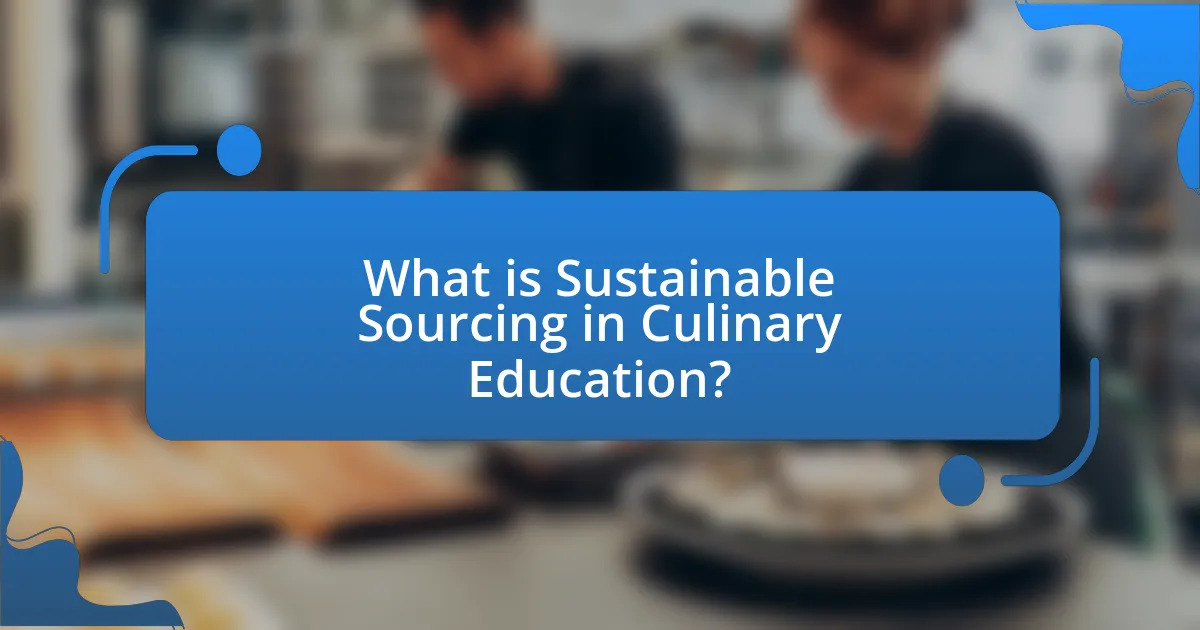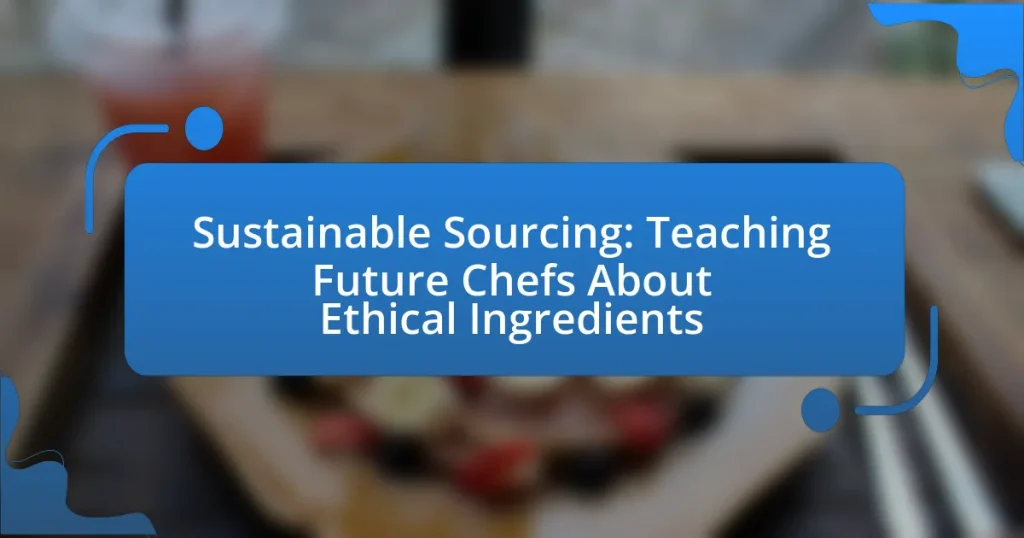Sustainable sourcing in culinary education emphasizes the procurement of ingredients that are environmentally responsible, socially equitable, and economically viable. This article explores the significance of sustainable sourcing for future chefs, detailing its impact on food quality, environmental health, and local economies. Key principles include environmental stewardship, social responsibility, and economic viability, while challenges such as cost and availability are also addressed. The article further examines educational methods, including hands-on experiences and technology integration, that prepare culinary students to prioritize ethical sourcing in their practices. Additionally, it highlights best practices and resources available for chefs to stay informed about sustainable sourcing.

What is Sustainable Sourcing in Culinary Education?
Sustainable sourcing in culinary education refers to the practice of obtaining ingredients in a manner that is environmentally responsible, socially equitable, and economically viable. This approach emphasizes the use of local, seasonal, and organic products, which reduces carbon footprints and supports local economies. Research indicates that sustainable sourcing can lead to improved food quality and safety, as well as enhanced culinary skills among students, preparing them for a growing demand for ethical practices in the food industry.
Why is Sustainable Sourcing Important for Future Chefs?
Sustainable sourcing is important for future chefs because it ensures the use of ethically produced ingredients, which supports environmental health and social responsibility. By prioritizing sustainable sourcing, chefs can reduce their carbon footprint, promote biodiversity, and support local economies. Research indicates that sustainable practices in food sourcing can lead to a 30% reduction in greenhouse gas emissions associated with food production. Additionally, chefs who embrace sustainable sourcing can enhance their culinary creativity by utilizing seasonal and local ingredients, which often yield fresher and more flavorful dishes.
How does Sustainable Sourcing impact the environment?
Sustainable sourcing positively impacts the environment by promoting the use of renewable resources and reducing ecological degradation. This practice encourages the procurement of ingredients that are grown or harvested in ways that maintain biodiversity, minimize pollution, and conserve water. For instance, according to a study by the Food and Agriculture Organization, sustainable agricultural practices can reduce greenhouse gas emissions by up to 30% compared to conventional methods. Additionally, sustainable sourcing often involves local sourcing, which decreases transportation emissions and supports local economies.
What ethical considerations are involved in Sustainable Sourcing?
Ethical considerations in sustainable sourcing include fair labor practices, environmental impact, and animal welfare. Fair labor practices ensure that workers involved in the production process receive fair wages and work in safe conditions, which is crucial for maintaining ethical standards in sourcing. Environmental impact focuses on minimizing harm to ecosystems and promoting biodiversity, as sustainable sourcing aims to reduce carbon footprints and resource depletion. Animal welfare addresses the humane treatment of animals in food production, ensuring that sourcing practices do not contribute to cruelty or exploitation. These considerations are essential for fostering a responsible and ethical approach to sourcing ingredients in culinary education.
What are the key principles of Sustainable Sourcing?
The key principles of Sustainable Sourcing include environmental stewardship, social responsibility, and economic viability. Environmental stewardship focuses on minimizing ecological impact by sourcing materials that are renewable and sustainably managed, such as certified organic or fair-trade products. Social responsibility emphasizes fair labor practices and community engagement, ensuring that suppliers adhere to ethical standards and contribute positively to their communities. Economic viability ensures that sourcing practices are financially sustainable for both the supplier and the buyer, promoting long-term relationships and stability in the supply chain. These principles collectively support a holistic approach to sourcing that benefits the planet, people, and profits.
How do local ingredients contribute to Sustainable Sourcing?
Local ingredients significantly contribute to sustainable sourcing by reducing transportation emissions and supporting local economies. When chefs utilize ingredients sourced from nearby farms, they minimize the carbon footprint associated with long-distance shipping, which is a major contributor to greenhouse gas emissions. Additionally, purchasing from local producers fosters economic resilience within the community, as it keeps financial resources circulating locally. According to a study by the American Farmland Trust, local food systems can reduce carbon emissions by up to 50% compared to conventional supply chains. This dual impact on environmental sustainability and local economic support underscores the importance of local ingredients in sustainable sourcing practices.
What role does seasonality play in Sustainable Sourcing?
Seasonality plays a crucial role in sustainable sourcing by ensuring that ingredients are harvested at their peak, which enhances flavor and nutritional value while minimizing environmental impact. When chefs prioritize seasonal ingredients, they support local economies and reduce carbon footprints associated with transportation. For instance, sourcing strawberries in summer rather than winter decreases reliance on greenhouse production, which consumes more energy. This practice not only promotes biodiversity by encouraging the cultivation of a variety of crops but also aligns with sustainable agricultural practices that protect ecosystems.

How are Future Chefs Educated on Ethical Ingredients?
Future chefs are educated on ethical ingredients through a combination of formal culinary education, hands-on training, and exposure to sustainable sourcing practices. Culinary schools incorporate courses focused on the principles of sustainability, including the environmental and social impacts of food production. For instance, programs often include modules on farm-to-table practices, where students learn about sourcing local and organic ingredients, understanding food labeling, and the importance of supporting ethical farming practices. Additionally, many institutions partner with local farms and organizations to provide students with real-world experiences in ethical sourcing, reinforcing the importance of making informed choices about ingredients. This comprehensive approach ensures that future chefs are well-equipped to prioritize ethical considerations in their culinary practices.
What methods are used to teach Sustainable Sourcing in culinary schools?
Culinary schools teach Sustainable Sourcing through a combination of hands-on training, classroom instruction, and partnerships with local farms. Hands-on training involves practical experiences where students engage in sourcing ingredients directly from local producers, allowing them to understand the importance of seasonality and ethical practices. Classroom instruction covers topics such as the environmental impact of food production, supply chain transparency, and the principles of sustainable agriculture. Partnerships with local farms provide students with real-world insights into sustainable practices and foster relationships that emphasize the importance of supporting local economies. These methods collectively ensure that future chefs are well-equipped to make informed decisions about sourcing ingredients ethically.
How do hands-on experiences enhance learning about ethical ingredients?
Hands-on experiences enhance learning about ethical ingredients by allowing individuals to engage directly with the sourcing, preparation, and evaluation of these ingredients. This experiential learning fosters a deeper understanding of the environmental, social, and economic impacts of ingredient choices. For instance, when culinary students participate in farm visits or sustainable sourcing projects, they gain firsthand knowledge of agricultural practices, which helps them appreciate the importance of ethical sourcing. Research indicates that experiential learning can increase retention rates by up to 75%, compared to traditional learning methods, thereby reinforcing the significance of ethical considerations in culinary practices.
What role do guest speakers and industry professionals play in education?
Guest speakers and industry professionals play a crucial role in education by providing real-world insights and practical knowledge that enhance the learning experience. Their participation allows students to connect theoretical concepts with industry practices, fostering a deeper understanding of subjects such as sustainable sourcing and ethical ingredients. For instance, when chefs share their experiences with sourcing local and organic products, students gain firsthand knowledge of the challenges and benefits associated with these practices, which is essential for their future careers in the culinary field. This direct engagement not only enriches the curriculum but also prepares students for the realities of the industry, making their education more relevant and impactful.
How can technology aid in teaching Sustainable Sourcing?
Technology can aid in teaching Sustainable Sourcing by providing interactive platforms and resources that enhance learning experiences. For instance, online courses and webinars can deliver up-to-date information on sustainable practices and ethical sourcing methods, allowing students to access expert knowledge from anywhere. Additionally, simulation software can create real-world scenarios where students make sourcing decisions based on sustainability criteria, helping them understand the impact of their choices. Research indicates that incorporating technology in education increases engagement and retention rates, making it a valuable tool in teaching complex subjects like Sustainable Sourcing.
What tools and resources are available for culinary students?
Culinary students have access to a variety of tools and resources that enhance their education and practical skills. These include professional-grade kitchen equipment such as knives, cookware, and appliances, which are essential for hands-on training. Additionally, culinary schools often provide access to specialized resources like textbooks, online databases, and culinary software that cover topics from food safety to sustainable sourcing practices.
Furthermore, many institutions offer workshops, internships, and mentorship programs that connect students with industry professionals, allowing them to gain real-world experience and insights into ethical ingredient sourcing. Research indicates that practical experience and access to quality resources significantly improve culinary students’ competencies and understanding of sustainable practices in the kitchen.
How can online platforms facilitate learning about ethical sourcing?
Online platforms can facilitate learning about ethical sourcing by providing accessible resources, interactive courses, and community engagement opportunities. These platforms often host educational materials such as articles, videos, and webinars that cover the principles of ethical sourcing, including fair trade practices and environmental sustainability. For instance, platforms like Coursera and edX offer courses developed by universities that specifically address sustainable sourcing in the culinary field. Additionally, online forums and social media groups enable aspiring chefs to connect with industry experts and peers, fostering discussions and sharing best practices related to ethical ingredient sourcing. This combination of structured learning and community interaction enhances understanding and application of ethical sourcing principles in culinary education.

What Challenges Do Future Chefs Face in Sustainable Sourcing?
Future chefs face significant challenges in sustainable sourcing, primarily due to the complexities of supply chains and the availability of ethically produced ingredients. The demand for local, organic, and seasonal products often exceeds supply, making it difficult for chefs to consistently source these items. Additionally, fluctuating prices and the lack of transparency in sourcing practices can hinder their ability to make informed decisions. According to a 2021 report by the Culinary Institute of America, 70% of chefs expressed difficulty in finding reliable suppliers for sustainable ingredients, highlighting the pressing nature of this issue.
What barriers exist in sourcing ethical ingredients?
Barriers in sourcing ethical ingredients include high costs, limited availability, and lack of transparency in supply chains. High costs arise because ethical farming practices often require more resources and time, making products more expensive than conventional alternatives. Limited availability is a significant issue, as not all regions have access to ethically sourced ingredients, which can restrict options for chefs. Additionally, the lack of transparency in supply chains complicates the verification of ethical practices, making it difficult for chefs to ensure that their ingredients meet ethical standards. These barriers collectively hinder the widespread adoption of ethical sourcing in culinary practices.
How do cost and availability affect Sustainable Sourcing decisions?
Cost and availability significantly influence sustainable sourcing decisions by determining the feasibility of procuring ethically produced ingredients. When costs are high, chefs and businesses may opt for less sustainable options to maintain profitability, as seen in a 2020 study by the Food and Agriculture Organization, which indicated that price sensitivity often leads to compromises in sustainability. Additionally, limited availability of sustainable ingredients can force chefs to rely on conventional sources, undermining their commitment to ethical sourcing. This dynamic illustrates that both economic factors and resource accessibility are critical in shaping sustainable sourcing practices in the culinary industry.
What misconceptions do chefs have about Sustainable Sourcing?
Chefs often misconceive sustainable sourcing as being solely about organic ingredients. This belief overlooks the broader spectrum of sustainability, which includes factors such as local sourcing, fair trade practices, and environmental impact. For instance, a study by the Food and Agriculture Organization highlights that local sourcing can significantly reduce carbon footprints, demonstrating that sustainability encompasses more than just organic certification. Additionally, some chefs mistakenly think that sustainable sourcing is more expensive, while research from the Culinary Institute of America indicates that local and seasonal ingredients can often be more cost-effective. These misconceptions can hinder the adoption of comprehensive sustainable practices in culinary settings.
How can future chefs overcome these challenges?
Future chefs can overcome challenges in sustainable sourcing by integrating comprehensive education on ethical ingredients into their culinary training. This education should include understanding local sourcing, seasonal ingredients, and the environmental impact of food production. For instance, studies show that chefs who prioritize local and seasonal ingredients can reduce carbon footprints significantly, as local sourcing minimizes transportation emissions. Additionally, future chefs can engage with local farmers and suppliers to build relationships that promote transparency and sustainability in the supply chain. By adopting these practices, chefs can ensure they are making informed decisions that align with ethical sourcing principles.
What strategies can be implemented to promote ethical sourcing?
To promote ethical sourcing, culinary institutions can implement strategies such as integrating ethical sourcing education into their curriculum, establishing partnerships with certified suppliers, and encouraging transparency in the supply chain. By incorporating ethical sourcing education, future chefs learn the importance of sourcing ingredients responsibly, which fosters a culture of sustainability. Partnerships with certified suppliers ensure that ingredients meet ethical standards, such as fair labor practices and environmental sustainability. Encouraging transparency in the supply chain allows chefs to understand the origins of their ingredients, which can lead to informed purchasing decisions and greater accountability. These strategies collectively contribute to a more ethical food system.
How can collaboration with local producers benefit chefs?
Collaboration with local producers benefits chefs by providing access to fresh, high-quality ingredients that enhance menu offerings. This direct sourcing allows chefs to create dishes that reflect local flavors and seasonal availability, which can improve customer satisfaction and loyalty. Additionally, working with local producers fosters community relationships and supports the local economy, which can enhance a chef’s reputation and brand image. Studies show that restaurants emphasizing local sourcing can see increased patronage, as consumers increasingly prefer establishments that prioritize sustainability and ethical sourcing practices.
What are the best practices for Sustainable Sourcing in culinary arts?
The best practices for sustainable sourcing in culinary arts include prioritizing local and seasonal ingredients, selecting organic and sustainably farmed products, and minimizing food waste. Local and seasonal sourcing reduces transportation emissions and supports local economies, while organic farming practices promote biodiversity and soil health. Additionally, chefs can implement strategies such as composting and utilizing by-products to further reduce waste. According to the Food and Agriculture Organization, sustainable sourcing can lead to improved food security and environmental conservation, making these practices essential for future culinary professionals.
How can chefs effectively communicate the importance of ethical ingredients to consumers?
Chefs can effectively communicate the importance of ethical ingredients to consumers by utilizing transparent storytelling about sourcing practices and the impact of these choices on health, environment, and communities. By sharing specific details about where ingredients come from, such as local farms or sustainable fisheries, chefs can create a narrative that resonates with consumers’ values. Research indicates that 66% of consumers are willing to pay more for sustainable brands, highlighting the demand for ethical sourcing information. Additionally, chefs can engage consumers through interactive experiences, such as farm visits or cooking classes that emphasize ethical practices, thereby fostering a deeper understanding and appreciation for the ingredients used in their meals.
What resources are available for chefs to stay informed about Sustainable Sourcing?
Chefs can stay informed about Sustainable Sourcing through various resources, including industry publications, online courses, and organizations dedicated to sustainability. Notable publications like “The Good Food Institute” and “Sustainable Food Trust” provide articles and reports on sustainable practices. Online platforms such as Coursera and edX offer courses on sustainable sourcing and ethical ingredients, allowing chefs to enhance their knowledge. Additionally, organizations like the James Beard Foundation and the Culinary Institute of America offer workshops and resources focused on sustainable culinary practices. These resources collectively support chefs in making informed decisions about sourcing ingredients responsibly.


